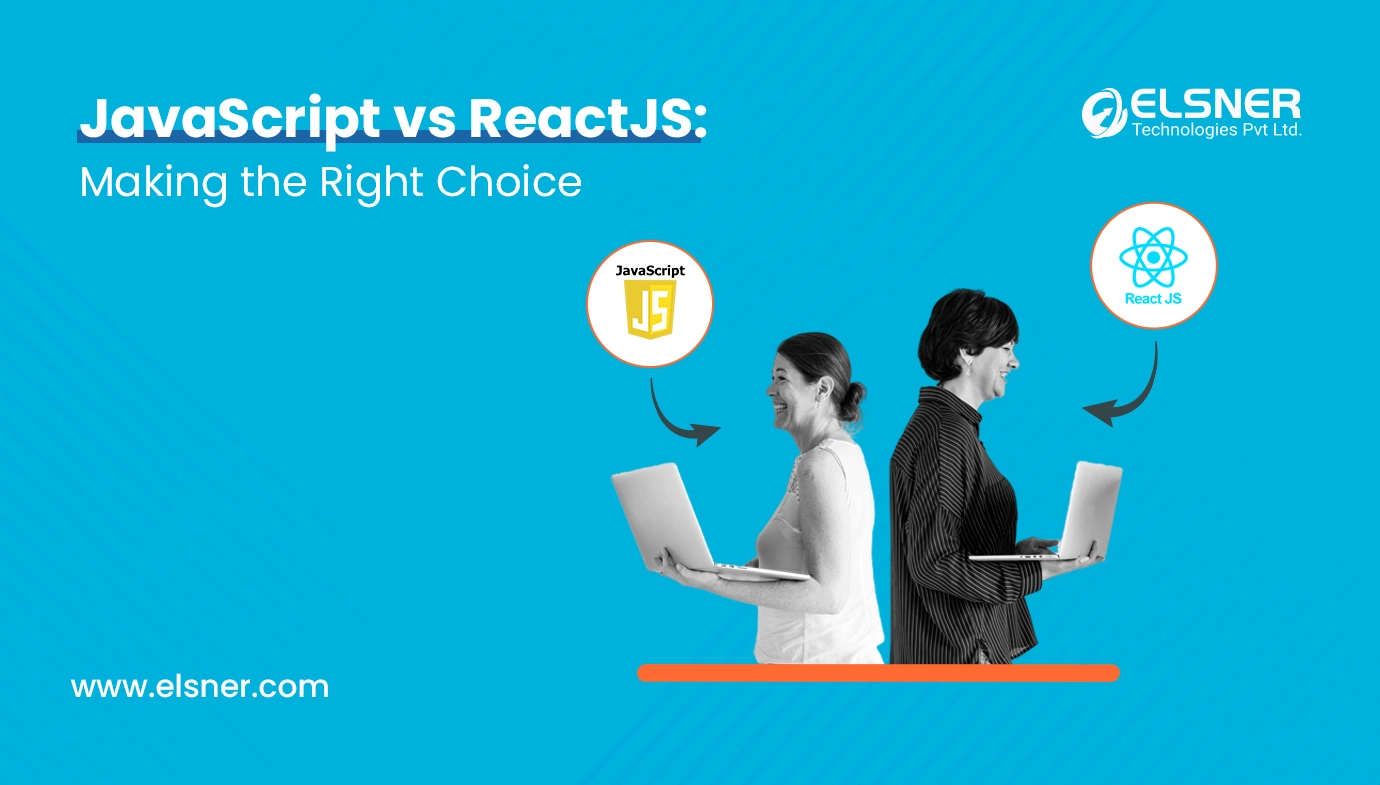- What is JavaScript?
- What are the Notable Features of JavaScript to Know About?
- Rich Ecosystem
- Versatility
- Community Support
- What is Referred to as React JS?
- What are the Most Important Features of React JS?
- Component-Based Architecture
- One-Way Data Binding
- Virtual DOM
- React vs JavaScript: What are the Key Distinctions between These?
- Ease of Use
- Performance
- Scalability
- Learning Curve
- React Typescript vs JavaScript
- What are the Key Advantages of Employing React with Typescript?
- Enhanced IDE Support
- Type Safety
- Improved Code Quality
- Typescript vs JavaScript React
- When to Choose to React JS Over JavaScript?
- For Long-Term Projects
- For Large-Scale Applications
- For Dynamic User Interfaces
- Hiring ReactJS Developers
- Look for Experience
- Evaluate Problem-Solving Abilities
- Assess Technical Skills
- Cultural Fit
- What are the Key Benefits that You Can Reap by Hiring a Professional React JS Development Company?
- Scalability
- Access to Expertise
- Cost-Effective
- How to Choose the Appropriate Development Agency?
- Reputation
- Technical Proficiency
- Communication
- Concluding Thoughts
Are you looking forward to selecting the appropriate technology stack for your web development project? If yes, two most common options that you may have come across are JavaScript and React JS. Although both of these tech stacks are highly popular among the developer community, it becomes crucial for you to understand the distinctions between these. Along with that, you should also learn their key advantages. It will help you to make a well-informed decision that best caters to your specific project requirements.
In this detailed blog post, we will discuss the differences between React JS and JavaScript i.e., React vs Javascript that will help you to make the right choice for your project. So, let’s dig in:
What is JavaScript?

What are the Notable Features of JavaScript to Know About?
Now that you know what JavaScript exactly is, it is the time to learn about its key features which we are going to discuss in detail in this section:
Rich Ecosystem
With a vast array of libraries and frameworks, JavaScript provides tools for virtually any task.
Versatility
JavaScript can be used for both front-end and back-end development, thanks to environments like Node.js.
Community Support
A large community of developers means extensive documentation, tutorials, and forums are available.
What is Referred to as React JS?
React JS is often known as React is a recognized open-source JavaScript library that is developed by Facebook. It is typically employed for the purpose of building user interfaces, especially for SPAs. Also, this library lets developers come up with large web apps that can be easily updated and rendered in response to any changes in data.
What are the Most Important Features of React JS?
Here are the key features of React JS that one should essentially have a clear idea about, before they hire ReactJS developers from a reputed React JS development company:
Component-Based Architecture
React promotes reusable components, which can significantly speed up development and make code maintenance easier.
One-Way Data Binding
This ensures data flows in a single direction, making debugging and testing more straightforward.
Virtual DOM
React’s usage of a virtual DOM facilitates boosting performance by minimizing direct manipulation of the actual DOM.
React vs JavaScript: What are the Key Distinctions between These?
While React JS is built using JavaScript, there are several distinctions between using plain JavaScript and adopting React JS for your project. Let’s have a look at React vs Javascript:
Ease of Use
- React JS: Simplifies the development process with its component-based architecture and use of JSX, which allows HTML to be written within JavaScript code, enhancing readability and maintainability.
- JavaScript: Requires extensive coding for dynamic updates and handling DOM manipulation, which can be error-prone and difficult to manage as the application grows.
Performance
- React JS: Uses a virtual DOM to optimize updates, leading to faster performance in applications with frequent data changes.
- JavaScript: Directly interacts with the DOM, which can lead to performance bottlenecks, especially with frequent updates.
Scalability
- React JS: Designed to handle complex and large-scale applications efficiently due to its modular nature and reusable components.
- JavaScript: Building large applications can become cumbersome and difficult to manage as the codebase grows.
Learning Curve
- React JS: Involves an initial learning curve due to new concepts like JSX, components, and state management, but can be more productive once mastered.
- JavaScript: Has a relatively shallow learning curve for basic functionality, but mastering advanced features and best practices requires time.
React Typescript vs JavaScript
After getting an idea about the differences existing in between React JS and JavaScript (JavaScript vs React), let’s have a look at the distinctions between React Typescript and JavaScript i.e., React Typescript vs Javascript:
Typescript is known to be a superset of JavaScript. It contributes to adding static typing to the language. So, with its aid, it is possible to catch errors especially during development rather than at runtime. When combined with React, Typescript can facilitate further boosting the development experience.
What are the Key Advantages of Employing React with Typescript?
Here are the most important benefits that you would be able to reap by using React with Typescript:
Enhanced IDE Support
Better autocompletion, navigation, and refactoring capabilities in modern IDEs.
Type Safety
Reduces runtime errors by catching type mismatches during development.
Improved Code Quality
Encourages the use of interfaces and types, leading to cleaner and more maintainable code.
Typescript vs JavaScript React
When comparing Typescript with JavaScript in the context of React development:
- JavaScript: Easier to set up and faster to get started with, making it a good choice for smaller projects or teams less familiar with Typescript.
- Typescript: Provides robust type-checking and a richer development experience, which can be particularly beneficial in large projects with complex data structures.
When to Choose to React JS Over JavaScript?

For Long-Term Projects
React JS is considered to be the best option to choose especially for long-term projects. It is where code scalability and maintainability tend to play a key role. Its focus on reusable components as well as clear data flow can considerably reduce technical debt, particularly over time.
For Large-Scale Applications
If your project encompasses building a large-scale app with intricate user interfaces, React JS is considered to be the better choice. Its virtual DOM and component-based structure make it effortless for you to optimize and manage performance.
For Dynamic User Interfaces
Apps that necessitate dynamic content and frequent updates will considerably benefit from efficient rendering abilities and state management of React JS.
Hiring ReactJS Developers
To leverage the complete potential of React JS, all that you need is to have expert developers on your team. Here are some tips for hiring the right talent:
Look for Experience
When you hire ReactJS developers, prioritize those with proven experience in building and maintaining React applications. Check their portfolio for relevant projects and their contributions to the React community.
Evaluate Problem-Solving Abilities
React developers should be adept at solving complex problems and optimizing application performance. Consider including practical tests or coding challenges in your hiring process.
Assess Technical Skills
Ensure the developers have a solid understanding of core React concepts, including components, state management, hooks, and the virtual DOM. Familiarity with Typescript can be an added advantage.
Cultural Fit
When you hire dedicated ReactJS developers, ensure they align with your company’s values and culture. A good cultural fit can enhance collaboration and productivity.
What are the Key Benefits that You Can Reap by Hiring a Professional React JS Development Company?
There are a number of advantages that one can reap by establishing collaboration with a reputed React JS development company. Here, we are going to mention some of the most important ones. So, let’s find out:
Scalability
Whenever you get in touch with a professional agency, they will make sure to effortlessly scale your development team up or down based on your unique project needs.
Access to Expertise
Mostly, the ReactJS development agencies are known for possessing expert professionals who possess diverse skill sets.
Cost-Effective
By using the resources of a development agency, you would be able to effectively save on training, recruitment, and infrastructure costs.
How to Choose the Appropriate Development Agency?
In order to make the right choice, there are certain factors that one should take into consideration. Some of these include the following:
Reputation
Search for agencies possessing a strong track record and positive client testimonials.
Technical Proficiency
Ensure the company has expertise in React JS and related technologies like Typescript, Redux, and Node.js.
Communication
Effective communication is key to successful collaboration. Choose a company that values transparency and regular updates.
Concluding Thoughts
So, after reading this blog post about Javascript vs React from the start to the end, it will become incredibly easy for you to make a decision in between React and JavaScript. Ultimately, the choice between these two is dependent on your specific project requirements, long-term goals, and scale.
Among these, React JS is known for offering an efficient, structured, and scalable approach that facilitates building intricate user interfaces. Whereas, JavaScript offers the much-needed versatility and simplicity. Not only that, but the integration of Typescript with React can further bring improvement in the development procedure by offering type safety and enhanced tooling.
Whether you plan to hire a dedicated ReactJS developer or establish partnership with a reputed ReactJS development agency, the right expertise can considerably affect the success of your product. Thus, by comprehending the strengths and use cases of all the discussed technologies, it is possible for you to make a well-informed decision that best caters to your unique objectives and vision.

About Author
Tarun Bansal - Technical Head
Tarun is a technology enthusiast with a flair for solving complex challenges. His technical expertise and deep knowledge of emerging trends have made him a go-to person for strategic tech initiatives. Passionate about innovation, Tarun continuously explores new ways to drive efficiency and performance in every project he undertakes.





